________________
354 The Philosophy of Vallabha
[сн. mišra. The jñāna-mišra ("mixed with knowledge”) may be of three kinds, high, middling and lower. The vairāgya-mišra (“mixed with detachment") is only of one kind. The karma-miśra ("mixed with action") is of three kinds.
The principal means by which bhakti is attained through the grace of God is purity of heart. There are sixteen means prescribed for attaining purity of heart, of which some are external and some internal. The three externals are ablutions, sacrifices and imageworship. The practice of meditation of God in all things is the frurth. The development of the sattva character of the mind is the fifth. Abnegation of all karmas and cessation of attachment is the sixth; showing reverence to the revered is the seventh. Kindness to the poor is the eighth. To regard all beings as one's equals and friends is the ninth. Yamas and niyamas are the tenth and eleventh respectively. Listening to the scriptures from teachers is the twelfth, and listening to and chanting of God's name is the thirteenth. Universal sincerity is the fourteenth. Good association is the fifteenth. Absence of egoism is the sixteenth.
There is however a difference of view between two important schools of the bhakti-path. Those who follow the maryādā-bhakti think that bhakti is attainable by one's own efforts in following specific courses of duties and practices; the followers of the pustibhakti think that even without any effort bhakti can be attained by the grace of God alonel
The Vallabhas belong to the puşti-bhakti school and therefore do not admit the absolute necessity of personal effort. The followers of the maryādā school also agree that the sādhanas are to be followed only so long as affection does not show itself; when once that has manifested itself, the sādhanas can no longer be regarded as determining it, for it manifests itself spontaneously. For the followers of the pusti school the sādhanas can at no stage determine the bhakti; for it is generated through the grace of God (pusțimārge raranam eva sādhanain). According to the maryādā school sins are destroyed by the practice of the sādhanas and emancipation attained through the rise of affection. To the followers of the pusti school the grace of God is sufficient to destrov obstructions of sins, and there is no definite order about the practices following affection or
krti-sādhya-sādhana-sudhya-bhaktir mary'ādā-bhaktih tadralitānām bhagar'ad-anugrahaika-prāpya-pusti-bhaktih. Bhakti-mārtanda, p. 151.




